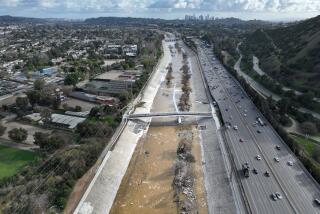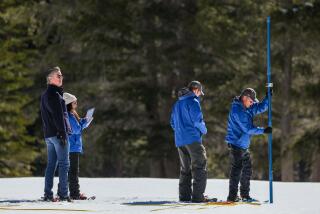THE CALIFORNIA DROUGHT : Wilson Plans to Hoard Recent Storm Output : Supplies: Governor says state received about 25% of average yearâs rainfall. Stored water will be used as a hedge against the dry spell continuing.
SACRAMENTO â Gov. Pete Wilson reported Thursday that the recent big storm dumped about 25% of an average yearâs rainfall on the state, but said most of the captured new water will be hoarded as a hedge against the drought possibly lingering into 1992.
The drenching, which Wilson described as the equivalent of two normal winter storms, added more than 700,000 acre-feet of water to reservoirs in the Central Valley and along the North Coast, he said.
As a comparison, this yearâs total deliveries from both the state water and federal Central Valley projects combined had been pegged at only 3.2 million acre-feet before the storm.
The governor announced at a news conference that because of the heavy storm and his Administrationâs success in coaxing farmers to sell water to a state âwater bank,â he had decided âat this timeâ not to evoke his emergency powers to deal with the drought.
But Wilson cautioned that he might invoke those powers if more farmers do not sell to the water bank, if the rains quickly peter out or if local communities drag their feet on rationing.
These emergency powers, which Wilson equates with declaring martial law, would enable him to usurp local authority, suspend legal contracts and condemn peopleâs water for others to use.
A lot will depend, water officials said, on the size of the next storm, which is expected to hit California this weekend.
While much more optimistic about Californiaâs water situation than he was two weeks ago, Wilson stressed that âthis (recent) storm did not break the drought. The drought has seared this state for five years and there is no clear end in sight.â
The governor also announced the details of a proposed $107.4-million Drought Action Fund he will present to the Legislature next week. The six-bill package would spend:
$44.8 million to help communities find and conserve water.
$33.6 million to boost the stateâs firefighting ability. âOur forests are still tinderboxes,â Wilson said. âWe might well face the worst fires in California history this summer and fall.â
$24.2 million âto maintain minimum populationsâ of fish and wildlife.
$2.6 million to permit the California Conservation Corps to expand its wildlife protection and firefighting effort.
$1.2 million to âensure the quality of our drinking water.â
$1 million âto catch water rustlersâ who âflout the lawâ and illegally take water. âIn the Old West, they might have met the same fate as rustlers,â Wilson said, before pausing to add: âThey might in the New West.â
Wilson said the recent storm may have raised the Northern Sierra snowpack to 40% of normal, but a more accurate measurement will be taken Monday. Before the storm, the snowpack had only been 14% of normal.
âNo one can be sure what Mother Nature holds for the future,â Wilson said. âTherefore, we will maintain enough water in our reservoirs to guarantee human health and safety should 1992 be another dry year.â He added that this âprudent reserveâ would account for most of the recent storm.
Responding to a reporterâs question, Wilson criticized past Sacramento regimes--without specifically naming any--for not saving enough water for drought emergencies and for not building more storage facilities.
He called for development of more community reservoirs financed primarily with local money.
Wilson established the water bank three weeks ago with the aim of purchasing 500,000 acre-feet of water. But he said that because of the storm, less water may now be needed. Already, he reported, the state has signed 100 contracts--primarily with farmers in the Sacramento-San Joaquin Delta--for purchase of more than 140,000 acre-feet of water. He predicted that at least another 200,000 acre-feet will be bought, principally from Sacramento Valley rice farmers.
More to Read
Sign up for Essential California
The most important California stories and recommendations in your inbox every morning.
You may occasionally receive promotional content from the Los Angeles Times.











